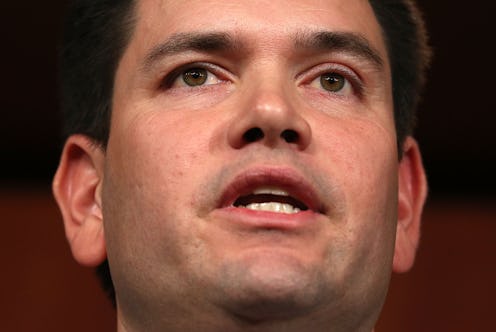News
Marco Rubio's View On Cuba Is "Old-School"
When President Obama announced in December his intent to reopen relations with Cuba, he had one big detractor: Marco Rubio. With an "old-school" view of the Central American country, Rubio opposes the restoration of diplomatic ties with Cuba and the reestablishment of a U.S. embassy in Havana. But as Rubio gears up for his presidential run, which he announced on Monday, Cuba could be a sore talking point for the son of Cuban immigrants.
Soon after Obama said the United States had opened talks with Cuba, Rubio said in a press conference he was committed to doing everything in his power to "unravel" the president's Cuba policy. He declared Congress would not lift the embargo, a threat that is more real than not given Rubio's position as chair of the Senate's foreign relations subcommittee that oversees U.S. relations in the Western hemisphere. Rubio has also repeatedly called Fidel Castro "a thug" who took power and forced Cubans to flee, including, he claims, his parents.
Rubio's staunch opposition to reinstating full diplomatic relations with Cuba can be attributed to his upbringing. In his autobiography American Son, Rubio said he adopted his grandfather's anti-Castro views and, as a child, imagined liberating the country of his heritage.
I boasted I would someday lead an army of exiles to overthrow Fidel Castro and become president of a free Cuba.
In the past several months, Rubio has become the loudest opponent to Obama's open-Cuba policy that would end more than a half-century of economic sanctions. The Florida senator claims reinstating ties with Cuba would not benefit its people nor lead to freedom and liberty for the country. He also has questioned how America would benefit from such a policy.
This entire policy shift announced today is based on an illusion, based on a lie. The White House has conceded everything and gained little.
When it comes to possibly taking Cuba off America's terrorism list, Rubio firmly opposes. Just last week, Rubio blasted Obama's Cuba policy in an interview with conservative news site Breitbart, calling it "ridiculous." He said he saw the policy as an attempt to cement Obama's legacy as a peacekeeper.
I don’t see how they can rationalize taking them off the list, other than the president’s desire to achieve a legacy issue that he’s the one that opened up Cuba and changed fifty years of policy.
A new poll, conducted by Bendixen and Amandi International, surveyed 400 Cuban Americans in the United States and found support had grown for Obama's Cuba policy. Now, 51 percent say they agree with the decision as opposed to only 44 percent back in December. For Cuban Americans born in the United States, the number is significantly higher at 66 percent. However, only 45 percent of those born in Cuba support the shift.
Rubio has long relied on his parents' immigration narrative to show he's the product of an American dream. Cuban relations is a divisive issue for a large portion of Florida's population, one that holds critical voting power in an important swing state. It's a key demographic that Rubio wants, and frankly needs, to lock in.
Images: Getty Images (2)
